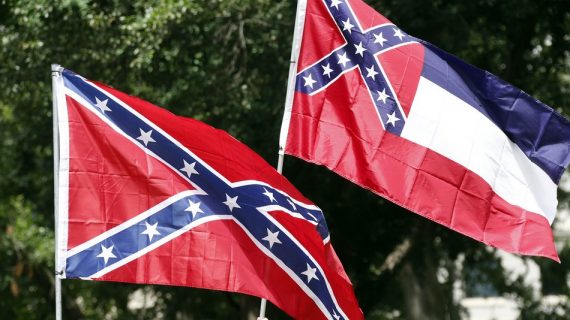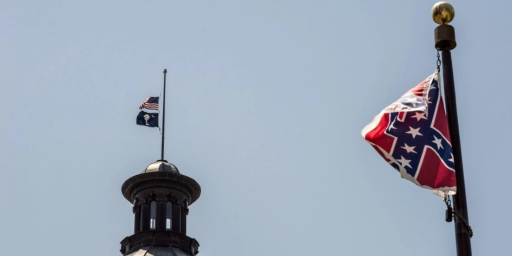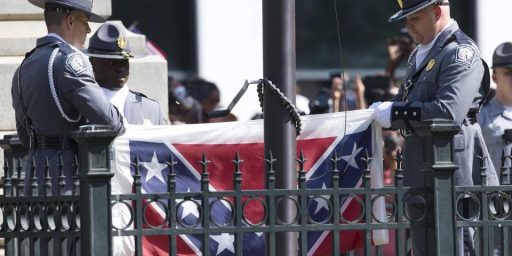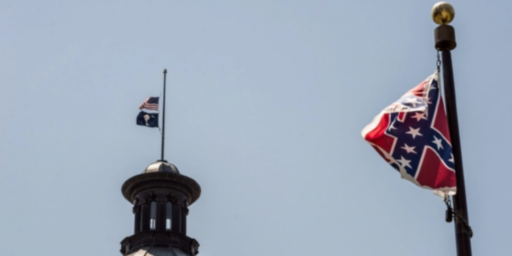Mississippi Still Trying To Rid Itself Of Confederate Flag, Enter 21st Cenutry
Five months after Charleston, Mississippi is still struggling to rid itself of symbols of the Confederacy.
It’s been several months now since the shootings at Emanuel A.M.E. Church in Charlston, South Carolina led to a debate over the Confederate flag that led the State of South Carolina to remove it from public grounds at the State Capitol in Columbia as well as moves by private retailers and other states to remove Confederate symbols from public spaces. One of the more prominent places where the debate rages on, though, is Mississippi, where the Confederate flag remains part of the state flag as well a part of the culture of the state:
LOUISVILLE, Miss. — In single strokes after the massacre of nine black churchgoers in Charleston in June, Confederate battle flags were taken from statehouse grounds in South Carolina and Alabama, pulled from shelves at major retailers like Walmart and declared unwelcome, if to limited effect, at Nascar races.
What happened so swiftly elsewhere is not so simple in Mississippi. The Confederate battle flag is not simply flying in one hotly disputed spot at the State Capitol but occupying the upper left corner of the state flag, which has been flying since 1894. And as recently as 2001, Mississippians voted by a nearly two-to-one ratio to keep it. Recent polling suggests the majority have not changed their minds.
“My flag’s been flying for 33 years, and I’m not about to take it down,” said Nancy Jenkins, 58, a postal worker who is white and who flies the Mississippi flag and the United States flag at her house a block south of Louisville City Hall. “It doesn’t stand for hate. It means a lot of people fought and died.”
Over the past few months, there have been scattered outbreaks of municipal defiance by those who find the Confederate flag offensive, as mayors and city councils from the Delta to the Pine Belt have decided to no longer fly the state flag.
But beyond these sporadic gestures, any organized effort was always going to wait until politicians were on the safe side of this year’s election. With the closing of the polls on Tuesday night, what could turn out to be the last battle over the Confederate flag in Mississippi has begun in earnest.
“It’s all about momentum,” said Dane Waters, the head of Tipping Point strategies, a communications and advocacy firm. “If you take a pocket here and pocket there of things happening, I don’t think anything is going to change.”
This week, Mr. Waters, a self-described conservative who has been retained by a group of people he declined to name, will arrive in Mississippi to pick up a difficult task: forming an unlikely and perhaps unmanageable alliance of preachers, business executives, state boosters and civil rights advocates to remove forever the Confederate battle flag from the state flag.
He is working with the Flag for All Mississippians Coalition, which was started by Sharon Brown, an activist in Jackson, who is black. The campaign has already been organizing supporters and held a hundreds-strong rally at the State Capitol. But Mr. Waters spoke of other tools that will be brought to bear outside the public eye, such as pressure on political donors and lobbying in the Legislature.
The coalition that he and others are trying to put together would need to unite groups almost never politically aligned, testing the depth of what Mr. Waters called the state’s “tremendous social, economic and racial divide.”
In the immediate aftermath of Charleston, it seemed that such a coalition might be possible here. Several conservative political leaders called for a change, including the state’s two United States senators and the speaker of the Mississippi House (inspiring critics to print “Keep the Flag, Change the Speaker” yard signs). Down came flags at city buildings in Grenada, Magnolia, Starkville, Clarksdale and Yazoo City. In October, even the University of Mississippi lowered the flag at the circle where segregationists once clashed with federal troops over the admission of James Meredith.
But the move to change the flag, which, in the words of the daughter of the state senator who designed it, was intended to “perpetuate in a legal and lasting way that dear battle flag under which so many of our people had so gloriously fought,” is not widely popular. It takes no time at all in any Mississippi downtown to find that out.
“This is what we stand for — this is our pride,” Trey Jefcoat, a 26-year-old construction worker in Hattiesburg, said on the October day that the nearby University of Southern Mississippi took down the state flag on campus. “We don’t think it’s offensive, and most of the black folks I know don’t think it’s offensive.”
Partisanship in Mississippi has become ever more racially polarized, and there are few topics on which racial division has been more explicit. In the 2001 referendum, according to the book “Mississippi Politics: The Struggle for Power, 1976-2008,” 90 percent of whites voted to keep the flag as it is. Among blacks, 95 percent voted for a new design, which replaced the cross with a circle of white stars.
“Don’t try to force me as a black man who knows his history to honor something that goes against my heritage,” said Robert Brown, a 42-year-old barber in Louisville, a small town in the central Mississippi pines with a population that is about 60 percent black.
Passions run so high regarding this issue in the Magnolia State, that one man is charged with bombing a Wal-Mart over that chains decision to stop selling Confederate flags:
A man who has been called a longtime supporter of the Mississippi state flag — and the controversial symbol within it — is accused of bombing a Wal-Mart in that state because the retail giant stopped selling the Confederate battle flag, police said.
Marshall E. Leonard, 61, from Tupelo, Miss., was arrested and is set to be charged on Tuesday with detonating an explosive after he threw an explosive device into a Wal-Mart on Sunday morning, Tupelo Police Chief Bart Aguirre told The Washington Post. The device made a loud noise but did no real damage to the store.
“He’s a strong supporter of keeping that flag flying,” Aguirre told the Associated Press. “This is his way of bringing attention to that.”
It’s not surprising that this is happening in Mississippi, of course. Notwithstanding the fact that the debate that swept the south in the wake of the Charleston shootings saw a renewal of the effort to remove the Confederate flag from the state flag that earned the support of one of the most powerful politicians in the state, it was readily apparent that Mississippians as a whole were not nearly as open to the idea of putting the past behind them as people in other parts of the south. It wasn’t that long ago, after all, that a statewide referendum was held on the issue and voters overwhelmingly approved keeping the flag as it stands today. The racial division in that referendum between the state’s African-American and white residents was, of course, as deep as you expected it would be, but the support among white Mississippians was in that referendum, and apparently remains if the events in the state since the summer’s controversy are to be believed, was quite bipartisan. If nothing else, this would seem to indicate that it’s unlikely that we will see the kind of bipartisan agreement to remove the Confederate flag that we saw in South Carolina in the wake of the Charleston shootings. Instead, we will see measures like the decision of the University of Southern Mississippi to remove the state flag from campus grounds until it is changed, although it’s unclear if we’ll see similar steps at the University of Mississippi or Mississippi State University, both of which seem to be far more traditionally “Mississippi” in many respects.
The reality, of course, is that the debate that occurred in South Carolina in the wake of Dylann Roof’s racially motivated murders in a church closely tied to both the struggle against slavery and the Civil Rights Movement is one that needs to occur throughout the south, and perhaps nowhere more than in Mississippi which was a focal point of both the worst aspect of the Confederacy and the resistance to the end of Jim Crow. Whatever those nostalgic for the history of the Civil War might tr to say, it is obvious that the Confederate Battle Flag long ago became a symbol of hatred and resistance to racial equality rather than some remembrance of heritage. In some sense, the debate over this issue was settled in the wake of the war, when Robert E. Lee himself, who became President of what is now Washington & Lee University in Virginia argued that the flag should not be displayed in public and left instructions that no such flags were to be displayed at his funeral or his grave after he died. Indeed, it wasn’t until the resurrection of the Ku Klux Klan in the 1920s and then most especially the Civil Rights Movement in the 1950s that the flag seems to have become a public symbol again. After Brown v. Board of Education and similar decisions from the Supreme Court, and the efforts of the Eisenhower Administration and subsequent Presidents to enforce Federal laws protecting the rights of African-Americans, many states in the South began flying the flag and integrating it into their state symbols in what was obviously an attempt to foster resistance to Washington and an effort to intimidate the African-American residents of their respective states. As the years went by, many states began to abandon those symbols, but it was Charleston that really brought home the point that it was time to abandon the flag as anything other than a museum piece, which is the step that South Carolina has taken. Mississippi should take a cue from its fellow Southern state and enter the 21st Century already.





It is not a sign of racial hatred, except to those who project racism on everything. The flag in modern times is held for the idea of ‘Anti-Federalism’. Otherwise, you need to ban Islam and the Star and Crescent symbol, since they have 1400 years of hatred and slavery.
@Handsome Jack:
Why not pick something without the nefarious past associations to open rebellion and support for segregation then? Surely anti-federalists are smart enough to realize people won’t buy such a sh1tty excuse. Surely they’re not so insular as to rule out good PR in the campaign to promote anti-federalism.
Then again, your handle reminds me of video games’ most recent douchebag extraordinaire, so perhaps they aren’t that marketing-savvy.
Don’t let them take your flag, Mississippi! We lost ours in Georgia by back-room deals
and crooked politicians. Georgia went Republican for the first time because of the Barnes
Rat and his Coca Cola/Home Depot deals. Let people move out of your state who are
“offended”. Let them go up North where they will feel comfortable!
Given ’em time, while Ole Miss still fields the Rebels, the mascot is no longer Colonel Reb and now a black bear. Tim moves at its own pace in Mississippi. Though would not surprise me to see it come in the next session of the legislature as a way to stymie stymie other legislation.
If you don’t like the flag than crawl back across the Mason-Dixon Line. Stand tall Mississippi, don’t let them take your flag.
Scalawags take your agendas back North.
Mississippi likes their flag! It’s always some left wing nut from the North, or Left coast trying to divide, and erase history they don’t like. They voted, now go away and let Mississippi decide what’s good for them.
Doug: I know Ole Miss took down the flag (it’s mentioned in one of the articles you excerpted) and I believe State did as well.
If Mississippi wishes to be associated with the Confederate battle flag, it’s fine by me. Freedom of speech and association are what they are, warts and all.
1) The flag has nothing to do with the mentally ill Roof kid or modern hate groups. Your position plays into their hands.
2) Mississippi is not trying to rid it self of anything. Many Mississippians have ancestors that fought under the St. Andrews Cross battle flag.
State did not
Mississippi State did not take down the State of Mississippi flag.
The Confederate flag became a popular symbol among supporters of Strom Thurmond during his third-party presidential bid in 1948. Anyone who is familiar with that campaign can guess why.
@Handsome Jack: @Handsome Jack: Thank you, Handsome Jack, for defending the true meaning of the Rebel Flag.
No, it just has everything to do with treason, slavery, and racism…so much to be so proud of…
@walt moffett: You have to admit that Mississippi does have some good football teams and programs.
Around here I have seen more of those flags in the last several months than I have seen in decades. People have them on trucks, cars, houses, poles, businesses, caps, tattoos, and advertising. They should have just left it alone and it would have continued to fade away.
Keep your Flag Mississippi. My grandfather was from Pearl county and I spent time in Meridian in the Navy. Suffice to say, I’m swayed to support the magnolia state.
But the fact is, if you’re from Mississippi you owe all of us other taxpayers a few hundred dollars a year.
You live of the federal teat while proclaiming states rights.
@Handsome Jack: Our good-looking (apparently) friend says that the Rebel Flag is somehow associated with anti-federalism. He reveals a complete ignorance of “anti-federalism”. There is an actual….you know….like DEFINITION for anti-federalism. American history has a significant segment in which anti-federalists were important. There is a book called “The Federalist Papers” that one could….you know….like READ. Unless one went to Mississippi’s finest schools.
Such ignorance is the major reason that flag flies in MS.
@Albert Bryan:
Similarly, many Germans have ancestors that fought under the Nazi swastika, but you don’t see them agitating to put that on the German flag.
@JohnMcC:
I would presume that the poster above is referring to the idea of “states rights.”
Anyone who knows anything about those should be aware that “states rights” arguments have long been favored by segregationists who believed that the federal government had no business integrating their schools or allowing blacks to exercise their right to vote. So it’s humorous to see someone embrace states rights arguments while ignoring the motivation for making them.
The basic problem here is that white Southern culture is in a denial over the fact that it started a war to preserve slavery and that it lost that war — not only did the Southerners commit treason, but they weren’t particularly good at it. The end result is a historical revisionist movement that is akin to Holocaust denial, include bizarro explanations and a complete disregard for simple facts that could be verified with a few minutes of research.
Nobody cared much about this flag until Thurmond ran for president. Its symbolic value emerged as a post-war phenomenon because the South did not feel threatened by integration until then. The flag drama is powered by racial politics from start to finish.
@Pch101: “traitors” is it ? Think about this: after the war many Southern generals and soldiers resumed their service in the Army; serving in the campaigns to settle the western territories , and the conflict with Spain. The Army and War Department did not seem to have low disregard for them, nor did President Grant.
Per the US Code, “Whoever, owing allegiance to the United States, levies war against them or adheres to their enemies, giving them aid and comfort within the United States or elsewhere, is guilty of treason.” That would undoubtedly describe the Confederacy.
@Tyrell:
Oh yeah, the Capitol City Classic tween Alcorn and Jackson State was always worth watching. Plus, for some, sport was a way find meaning and a better living than day labor with a side job of waiting for scraps from the Country Club set.
@Henry Osborne:
No problem. Given that we essentially support you, can we have our money back, please? It’s only fair … 😀
@Albert Bryan:
Except, perhaps, it’s perennial status as the poorest state, or the state that leads the nation in such laudable categories as obesity (you’re number one), teen pregnancy (again, number one!), homicide rate (you’re number two, but you’re gaining …), employment rate (2nd lowest in the nation), and dumbest kids in the country (DC beat you. DC …).
Why, it sounds like paradise 😀
Of course there’s the historical image of Mississippi being a backwards hotbed of racism that you’ve been trying in vain to shed since the 1960s. Looks like you just set yourself back a few notches in that regard. Well played …
@Pch101:
This, more than any other factor, is what baffles me about this Southern sense of devotion to that flag. It’s a flag of defeat. They started a war, got their asses resoundingly kicked, and now they want to fly a flag to remind themselves of that ass-beating?
I think the heat down there does something to their minds …
@HarvardLaw92:
The Southern revisionists refer to it as The War of Northern Aggression and regard themselves as martyrs who are bullied by outsiders. So not only did they not start the war but they were and continue to be victims of it.
Sounds like another group that claims that the federal government, the media, and universities, among many others, are out to get them…oh wait…
@HarvardLaw92: It’s the heat. And the spiders. And the snakes. And the….
However, have noticed from my experience that the Southern flag is a very good indicator of a jackass with a chip on his shoulder a mile high and MRA characteristics.
Go ahead–label yourselves. We’re grateful.
I wish I could be a fly on the wall at the meetings between the Canadian consultant and The Panther-ette. He is attempting to mix oil with water; this coalition he thinks can be forged. Did not happen last time and won’t this time either.
I am from Mississippi. Some Mississippians would like to change the flag; most don’t. I want it to remain just as it is. In 2001 we voted by a 2-1 margin not to change the flag. Current public opinion polls show a majority is opposed to any change whatsoever. Therefore your headline is completely erroneous, in that Mississippi is NOT trying to rid itself of its flag, which features what is commonly known as a Confederate flag in the upper left corner.
Mississippi is trying to get people from other states to tend to their own business while we tend to ours. It is our flag and ours alone; no citizen from any other state should even be commenting.
@Pch101: This is incorrect. Upon seceding, Confederates owed no allegiance to the United States, and therefore did not commit treason.
Andrew Johnson issued a general pardon of all Confederates, including Jefferson Davis, in 1868. The reason he did this was because he knew that the U.S. Supreme Court was going to rule that Confederate soldiers and office holders in seceding states did not commit treason. So the law is plain on this issue.
I would agree that a strong argument exists that those from states which did not secede who fought for the Confederacy committed treason unless they formally changed their citizenship to a seceding state.
Nice to see that Southern Revisionism has made its way onto this thread yet again.
Article 1 Section 10:
No State shall enter into any Treaty, Alliance, or Confederation
No state shall, without the consent of Congress, lay any duty of tonnage, keep troops, or ships of war in time of peace, enter into any agreement or compact with another state, or with a foreign power, or engage in war, unless actually invaded, or in such imminent danger as will not admit of delay.
Article 6:
This Constitution, and the Laws of the United States which shall be made in pursuance thereof; and all treaties made, or which shall be made, under the authority of the United States, shall be the supreme law of the land; and the judges in every state shall be bound thereby, anything in the constitution or laws of any state to the contrary notwithstanding.
The Civil War should have made it clear that the federal government did not consent to secession.
In the future, it would be a good idea to avoid ratifying the Constitution if you don’t wish to be subject to it.